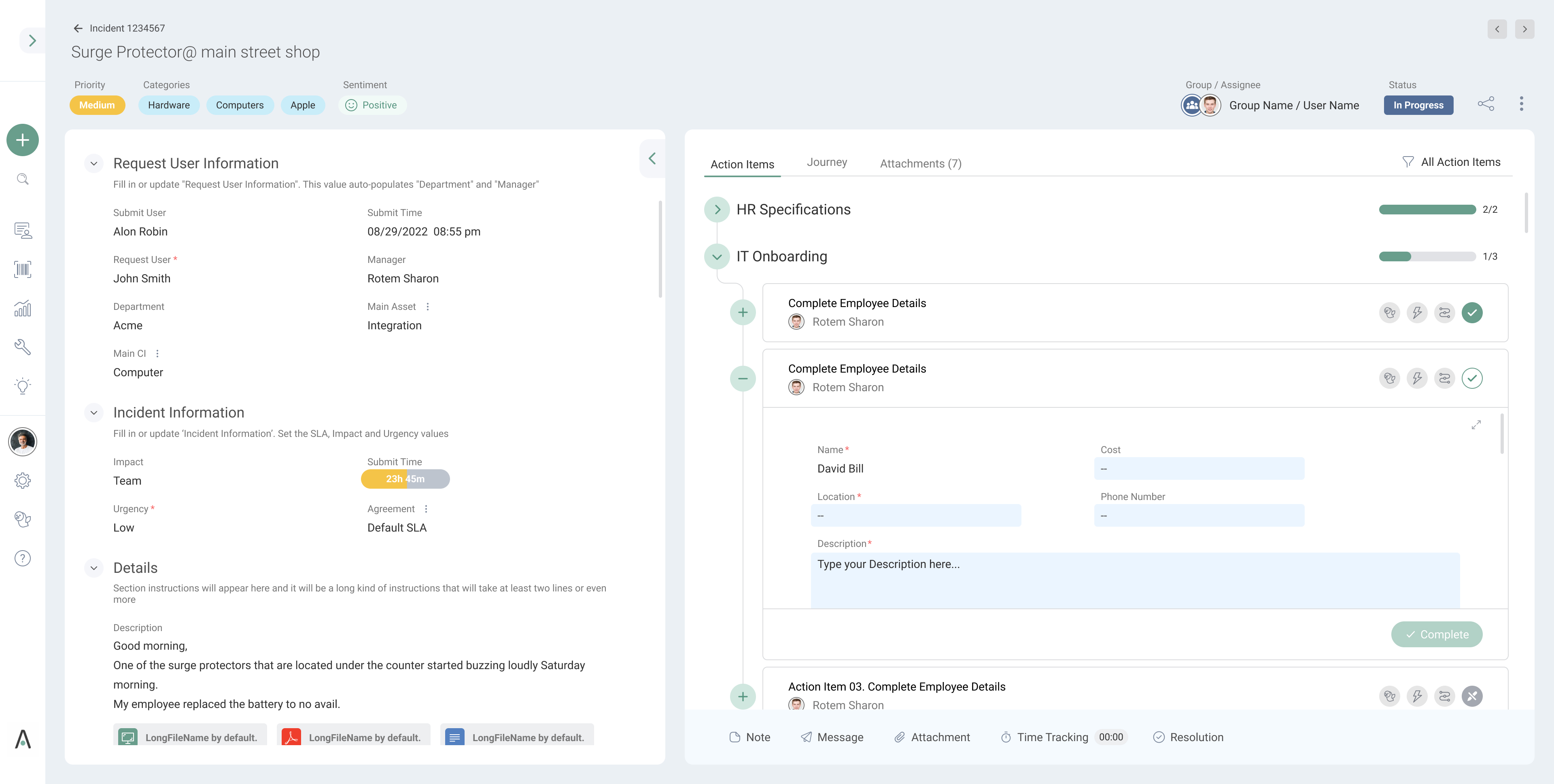Structured processes (Phases of Action Items) for managing and streamlining activities related to Requests, Changes, and Problems in a Resolution process.
Requirements:
Admins using Spaces ITSM Edition
Workflows include Phases of Action Items such as creating, managing actions, dependencies, and data — enabling SysAdmins and end users to streamline and maximize the efficiency of Resolution processes for organization-specific needs.
This document introduces and describes the structure and capabilities of Workflows and their role in Service Records.
Inside Workflows

Each Workflow consists of two entities; Phases and Action Items.
Phases
Phases separate the Workflow into multiple containers, which contain the Action Items, as defined by the SysAdmin in the Workflow Designer.
Action Items
Action Items are a section of Fields that constitute a form that users complete during the SR Resolution process.
Action Items (one or multiple) can be assigned to a User and/or Group within their relevant Workflows.
Action Items in a Template’s Workflow can be either independent (automatically activated when a relevant SR is opened) or dependent on other Action Items to appear.
Each Action Item is configured with a Status (Active/Completed/Disabled) determined by the SysAdmin.
Action Item Fields
You can add the following Fields to an Action Item:
Custom Fields | |
|---|---|
Action item custom Date 1 - 10 | Dates relevant to the Action Item |
Action item custom Float 1 - 10 | (Floating) integer decimal values relevant to the Action Item |
Action item custom Int 1 - 10 | Integer values relevant to the Action Item |
Action item custom List 1 - 10 | Listed information relevant to the Action Items |
Action item custom Notes 1 - 10 | Notes relevant to the Action Item |
Action item custom Text 1 - 10 | Short text relevant to the Action Item |
Custom Fields can be renamed under Settings > Customize > Translation.
Fields | |
|---|---|
Additional User | Add a user to part of a Workflow process |
Assignee | Combines the “Admin group” and “Assigned to” Fields as one Field that can’t be separated in Spaces. (These Fields appear as two separate Fields in the Workflow Designer.) The Assignee Field will appear in the Action Item Form when one of these two Fields is added in the Workflow Designer |
Approved | Approval (Y) or Rejection (N) of an Action Item |
Asset | Connect an asset to the Action Item |
Attachment | Let a user add an attachment to the workflow. The file can be attached both by the Agent and the end user.
|
Back out plan exists and tested | Indicate the existence or nonexistence of a tested back out plan |
Budgeted | Select if there is a budget for the Action Item or not |
CAB meeting reference | Reference number for the relevant CAB (Change Advisory Board) meeting |
Company | SR Request User’s Company |
Completed Time | Date and time of Action Item completion (populates automatically upon clicking Complete) |
Complexity | Complexity level of the Action Item |
Department To Charge | The department to be charged for the Action Item cost |
Due Date | Action Item Due Date |
Duration in hours | Number of hours spent handling the Service Record |
Enabled Time | Date and Time of Action Item Completion; populates automatically when Action Item enabled |
Expected Downtime Start | Expected beginning of downtime caused by SR Resolution |
Expected Downtime End | Expected end of downtime caused by SR Resolution |
Hardware Costs | Hardware costs associated with the SR |
Impact | How big an effect SR will have on your organization; chosen by Admins |
Installation Costs | Installation costs associated with the SR |
Instructions | Instructions for the Action Item |
Internal Manpower In Hours | Number of (manpower) hours for handling of the SR |
Location | Chosen Location for the Service Record |
Maintenance Costs | Maintenance costs associated with the SR |
Modify Time | Most recent time the Service Record was modified (Administrator clicked OK/Apply) |
Notes | Notes added to a Service Record |
Percent completed | Estimated progress of the Action Item |
Priority | Importance of Service Record Resolution for continued normal operation of the company |
Project | Existing project in the Action Item |
Proposed delivery date | Proposed date for SR Resolution delivery |
Proposed version | Part of the Release Management process; expected release version that includes this Change |
Recurrence | Frequency of issue recurrence |
Re-opened | Whether the Action Item has been reopened (populates automatically) |
Request Time | Time of SR Submission (populates automatically) |
Resources required in days | Estimated number of days required for the SR |
Software Costs | Software costs associated with the SR |
Submit User | The user who submitted the SR (can’t be changed) |
Task | Included Existing Task |
Title | Action Item Title |
Total Costs | Total costs incurred by the SR |
Total Expected Downtime In Hours | Total downtime expected due to SR handling |
Training Costs | Estimated costs for SR Resolution process training |
Urgency | How soon the SR will have a negative effect on your organization |
User Acceptance | Confirms that the Resolution was delivered as requested after the Change or in the pre-production stage |
Workflows in the Service Record
Service Record Workflows are documented in the following places within the service record:
Action Items tab
The Action Items tab is populated by Phases and Action Items as they were defined in the Workflow Designer.
The Action Item Field’s layout is based on the order within the Workflow Designer.
Journey
.png)
Workflow Action Items recorded in the Journey
The Service Record Journey logs the following Action Item changes and activities as a Journey Event in Full Journey Mode:
Activated
Completed
Field updated